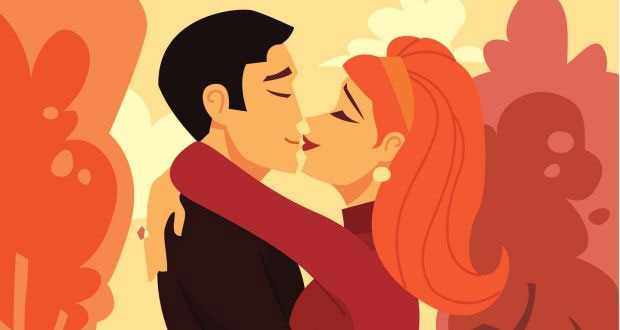Kissing is something truly strange when we think about it. Of course, we often become obsessed with the thrill (or excitement) when we think that wanting to kiss someone is quite challenging. However, if we pause to consider it, we will find that humans are one of the few animals that engage in real kissing.
Reasons Why People Kiss
What is the purpose of kissing? And why can we kiss each other for quite a long time? Delving into this issue, do we always kiss, or is it a relatively new initiative? While researchers may never definitively answer these questions, they must address some interesting definitions – these are the most convincing answers so far.
It provides us with a rich sensory experience
A highly convincing theory suggests that humans crave kisses because our brains yearn for stimulation from our most sensitive body parts, such as the lips.
The most sensitive parts of the body stimulate larger areas in the brain when touched. When you use your lips and tongue, which are extremely sensitive, the brain responds distinctly to them, even though these body parts are not large. Somatosensory, or tactile, a part of the brain, allocates more nerve cells to receive signals from the lips compared to signals from duller parts, such as the feet or back.

Kissing stimulates many nerve cells for both people at a certain moment.
Therefore, kissing stimulates many nerve cells for both individuals at a certain moment. We can easily identify this as it is a profound sensory experience – and also because we can share that experience with another person.
Kissing releases good hormones
Although this theory does not explain why people started kissing, it does clarify why we continue to do so.
When kissing, our brains automatically release certain types of hormones, such as Oxytocin – which makes us feel comfortable. Oxytocin is also partly responsible for feelings of intimacy, which we often refer to as “love.” Dopamine is another hormone released when we kiss someone we care about. Kissing also reduces the amount of Cortisol – a stress hormone.
Naturally, we crave these hormones and always seek them out wherever we can. Kissing is seen as a quick way for them to be released. Thus, we are often motivated to maintain this behavior.
We choose partners through kisses
In many modern cultures, kissing can be a sign leading to “sex.” And in that role, kissing seems to serve a very important purpose.
For example, in some studies, women admit that kissing is a method for them to choose new partners. There is a biological reason for this: according to some researchers, substances in saliva can inform us about who is an “ideal partner.” Saliva contains rich information that can react with our brains subconsciously when kissing someone.
Many other scientists believe that kissing “between humans” replaces relatively pungent pheromones, similar to how other animals use them to find partners. Most animal species can detect each other’s pheromones from a distance, so they do not need to kiss. However, humans do not have a very good sense of smell, making kissing the only effective way to obtain the information we need.
Originating from primitive humans
Another hypothesis suggests that modern kissing “evolved” from the practice of feeding infants orally or transferring chewed food. Over time, this oral contact developed from a practical method of feeding toothless infants into a meaningful way to express affection to someone you care about.

Saliva contains rich information that can react with our brains subconsciously when kissing someone.
Do all people kiss?
While all these hypotheses about kissing are indeed fascinating, the truth is: not everyone actually kisses.
In fact, some studies show that fewer than half of cultures have a truly romantic kiss. Therefore, there are two ways to think about this: either we are all natural kissers, and some cultures have suppressed this desire; or we are not, and many cultures have developed kissing in some way.
We may never know exactly why kissing developed, but science has certainly discovered some powerful motivations to continue doing it. So, don’t worry about the possibility that kissing might spread millions of bacteria (which are almost harmless). At least you will still gain those uplifting hormones along with valuable biological information with this romance.
Kissing: A unique human action
In fact, kissing is a unique action specific to humans. British scientist Melissa Hogenboom once shared a very… scientific perspective on human kissing, suggesting that one reason humans kiss is to allow both parties to perceive each other’s… scent more distinctly.
A person’s unique scent can quickly reveal a lot of information about them, such as diet, health status, emotional state, and compatibility between the two. Animals living in the wild have a very keen sense of smell, so they can easily pick up information about their counterparts.
According to Melissa Hogenboom, ancient humans wanted to provide information to their partners in the most effective and intimate way, which led to the invention of kissing.
The oldest documents about kissing have been found in India, dating back 3,500 years. Some anthropologists believe that kissing originated from ancient cultures in India and was transmitted to Europe after Alexander the Great conquered parts of what is now northern India.
Since discovering kissing, the Romans loved to kiss and created many types of kisses with different messages: there were kisses on the hand, cheeks, and lips… Kisses on the lips have various expressions for different types of relationships.
Studies on kissing began to emerge in the 19th century, indicating that the scientific community has been interested in kissing for a long time.
However, kissing is not universally practiced around the world; people in many cultures do not express their feelings through kissing. Anthropologist William Jankowiak states that only about 46% of the world’s population expresses romantic love through kissing.


















































